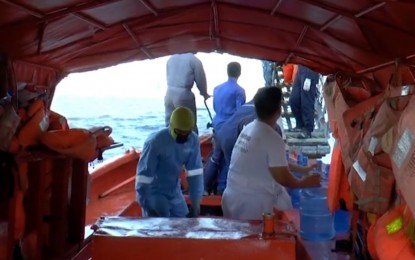
File photo
MANILA – The Trade Union Congress of the Philippines (TUCP) on Thursday emphasized the need for a "just" transition to save the jobs of around 500,000 Filipino seafarers amid the disruption caused by the 4th industrial revolution.
In a statement, TUCP Vice President Luis Corral said the innovations brought about by the 4th industrial revolution, such as digital information and automation systems, will likely cause massive job losses even as they create new jobs.
Corral said the government, as well as employers and shipowners, should provide appropriate policy and program support for the continuing education and upskilling of seafarers to help them retain their jobs or transition to suitable positions.
"TUCP advocates for a just transition policy with shipowners, employers, and government to save the jobs of our nearly 500,000 seafarers, and ensure that Filipino seafarers remain the preferred international hire. Seafarers’ jobs will be affected by the coming fourth industrial revolution in maritime fuels and networked digital information systems, part of the maritime industry’s commitment to decarbonization in response to the threat of climate change," Corral said.
He said more opportunities for upskill training should be provided to seafarers as an incentive for working and advancing in their organizations and to address a potential digital-skills gap at deployment.
"However, as the trend of employment flexibilization gradually shifted the responsibility for training from companies to seafarers, upgrading skills now require a costlier personal investment of seafarers in their training, to ensure their continued employment and career advancement. As upskilling opportunities may be unavailable on board or be too expensive for seafarers to undertake on their own, a skills-retention problem may result, leading to a skills gap at deployment," he said.
He pointed out that higher training costs also lead to unequal opportunities, between seafarers who can afford training and those lacking the resources.
He said the maritime industry must also create new career pathways for shore-based opportunities, even careers beyond seafaring, as the 4th industrial revolution's efficiencies lead to crew reductions and shorter on-board careers.
Corral also proposed the creation of a state industrial policy to develop Manila as an international deployment hub, which should include education policy prioritizing investment in science, technology, engineering, and mathematics (STEM) education, to match massive investments in infrastructure.
"Its success is premised on ensuring sufficient public and private investment in both basic and specialized maritime higher education and training, to result in a bigger pool of digitally-skilled seafarers of the future, fulfilling on-board and shore-based duties, as the industry will need," he said.
President Ferdinand R. Marcos Jr. earlier urged the country's maritime industry to adapt new technologies and secure emerging opportunities for Filipino seafarers.
In his speech during the Seafarers Summit at Conrad Hotel in Pasay City on June 26, the President emphasized the importance of investing in a highly qualified and well-trained workforce.
Marcos has ordered the Maritime Industry Authority and the Commission on Higher Education to work closely with the shipping industry on the upskilling and reskilling of Filipino seafarers to help them prepare for the shift of ocean-going vessels from using the conventional fuel sources to green ammonia between 2030 to 204
He assured that the government will continue to strengthen maritime-related policies and protect Filipino seafarers. (PNA)
